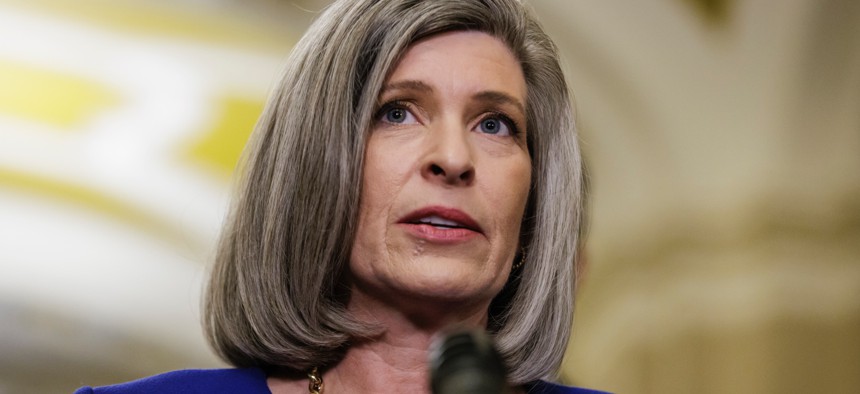
Sens. Joni Ernst, R-Iowa, and Gary Peters', D-Mich., new telework bill would require agencies publish their telework policies and establish systems to track use. Samuel Corum / Getty Images
Senators take another crack at improving federal telework data
The latest bipartisan bill aimed at better measuring the workplace flexibility’s effectiveness would require agencies to publish their telework policies, as well as implement already planned improvements to data collection on its usage.
Lawmakers have proposed yet another bill aimed at improving transparency around federal agencies’ use of telework, this time requiring a number of data reporting changes already underway in government.
Sens. Gary Peters, D-Mich., and Joni Ernst, R-Iowa, last week announced the introduction of the bipartisan Telework Transparency Act (S. 4043). The bill requires that federal agencies publish the policies governing telework for their workforce on their websites, as well as establish automated systems to track employees’ utilization of the workforce flexibility, federal building occupancy data and any effects on agency performance.
Since the COVID-19 pandemic’s ebb in 2022, congressional Republicans have pressured the Biden administration to cut back on telework, citing service backlogs at many agencies that cropped up during the pandemic. Ernst herself accused federal workers—without evidence—of committing “fraud” by moving to lower-cost regions while still collecting locality pay for their prior duty station. She repeated that accusation in a statement last week.
“Since ‘temporary’ telework policies went into effect over four years ago, the remote lifestyle comes at the expense of the people federal agencies are meant to serve,” she said. “My bipartisan bill will provide full transparency into the inefficiencies of telework, so taxpayers are no longer on the hook for expensive wasted space at federal headquarters and misspent locality pay.”
Much of the bill’s provisions governing data collection are already underway. The Office of Personnel Management, which compiles an annual report on telework albeit with data that is over a year old by the time it’s published, has been pushing agencies to provide more granular and timely telework data, including reports on the number of employees who have signed remote work and telework agreements, as well as ensuring workers “diligently” record their telework usage in HR or time and attendance software.
In a statement, Peters said the bill would ensure federal agencies use accurate and timely data when making decisions on their workforce policies.
“Federal agencies must track and consider the impact of telework on their ability to deliver services, recruit and retain talent and ensure office operations are cost-efficient,” he said. “My bipartisan bill will require agencies to gather accurate data on telework policies to provide more transparency and help ensure federal agencies are effectively carrying out their missions for the American people.”
The introduction of Peters and Ernst’s bill raises questions about the viability of another bipartisan piece of telework legislation in the form of the Telework Reform Act, a measure sponsored by Sens. Kyrsten Sinema, D-Ariz., and James Lankford, R-Okla., that codifies remote work in federal law, establishes stronger reporting and training requirements for telework and authorizes the noncompetitive hiring of military and law enforcement spouses into remote work jobs. That bill has twice seen its markup in Peters’ Senate Homeland Security and Governmental Affairs postponed.







